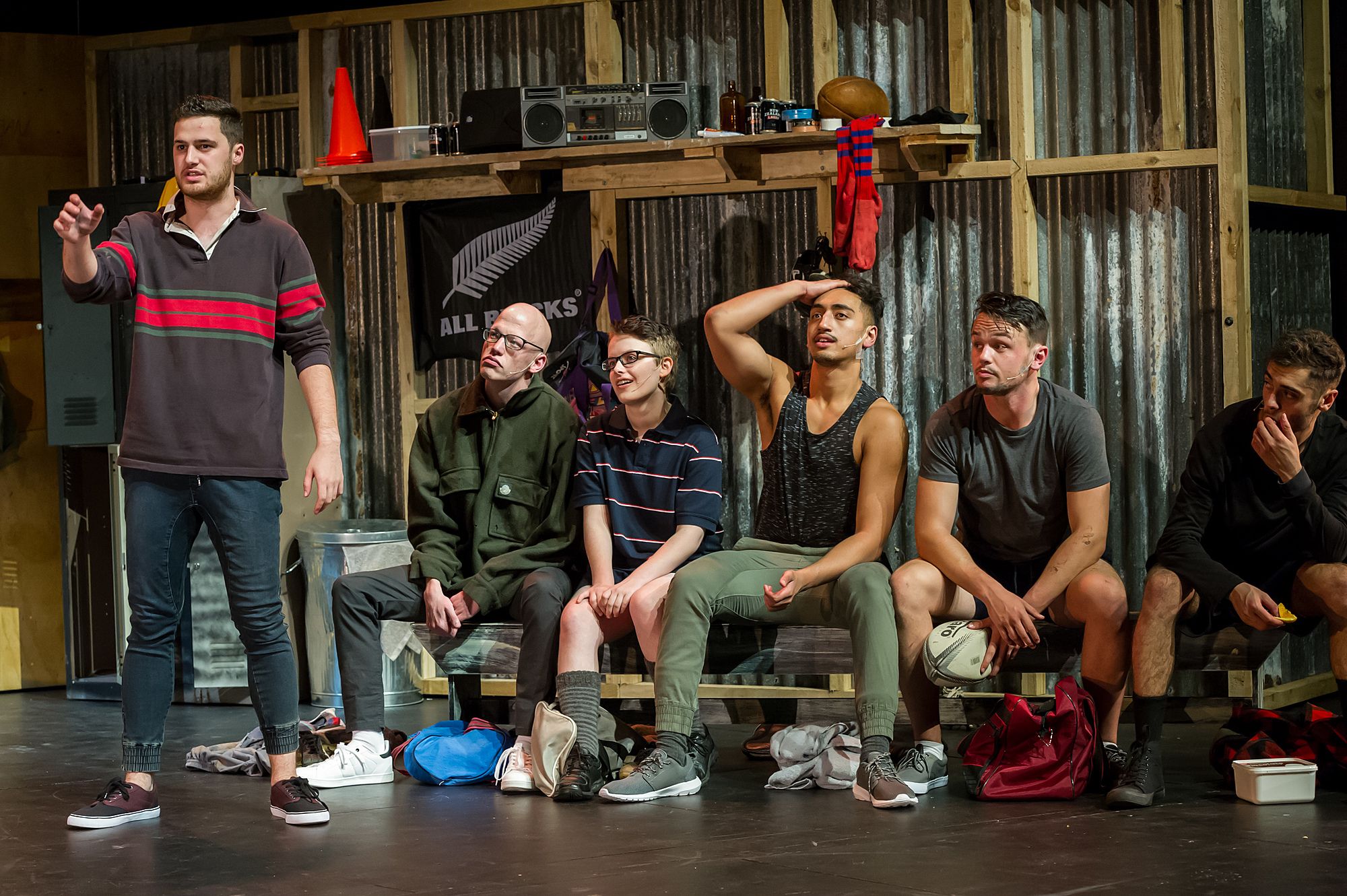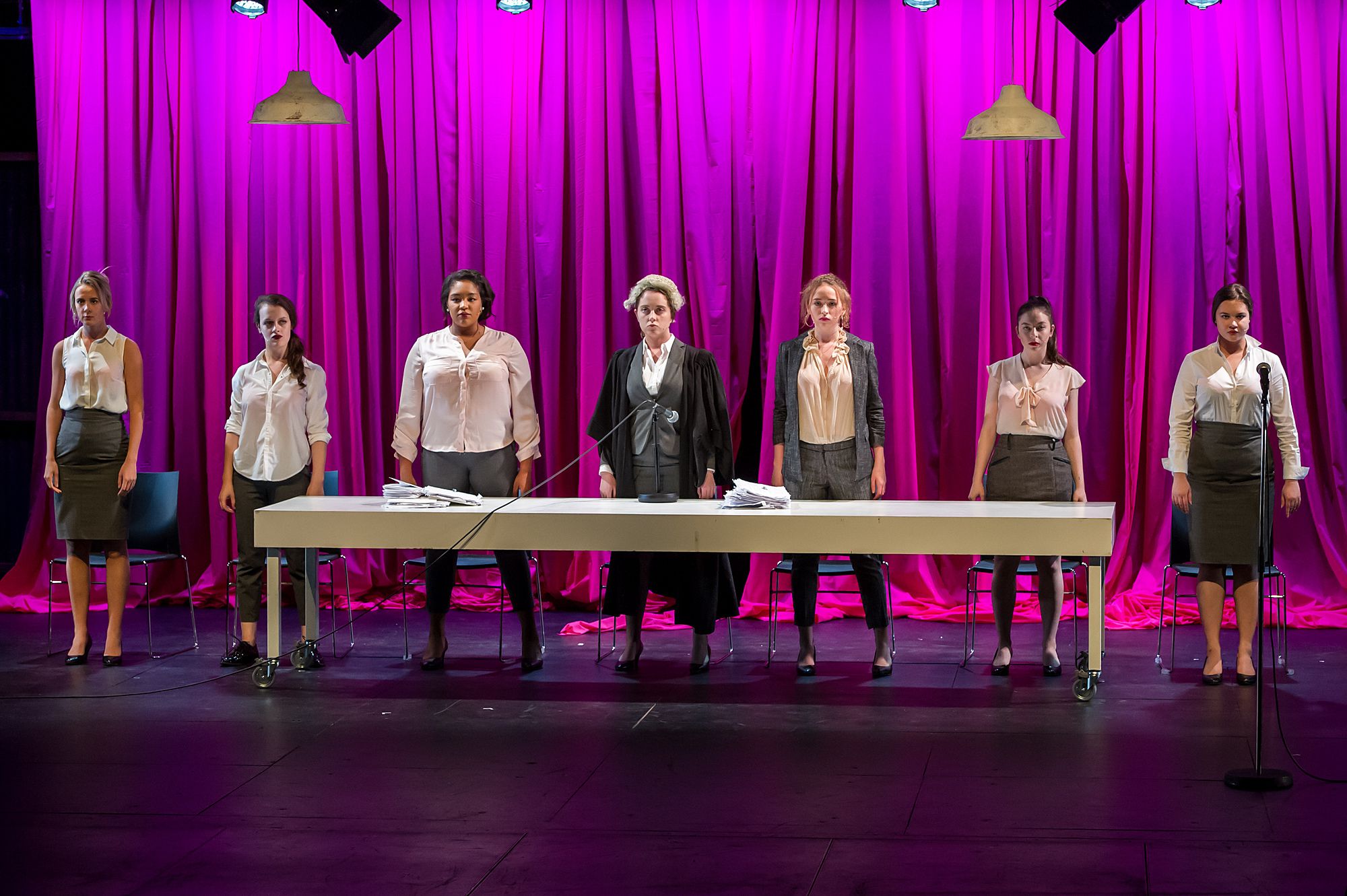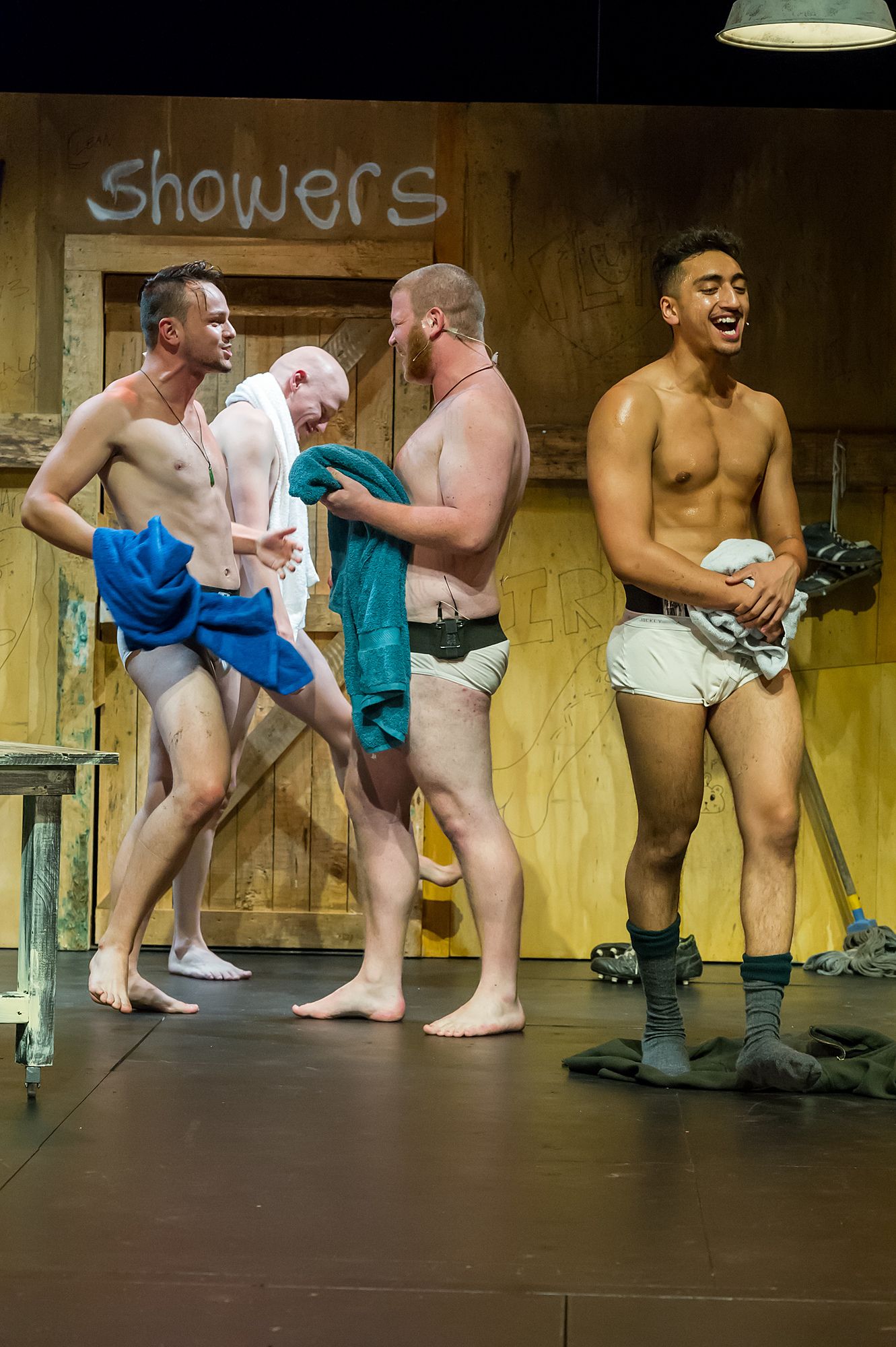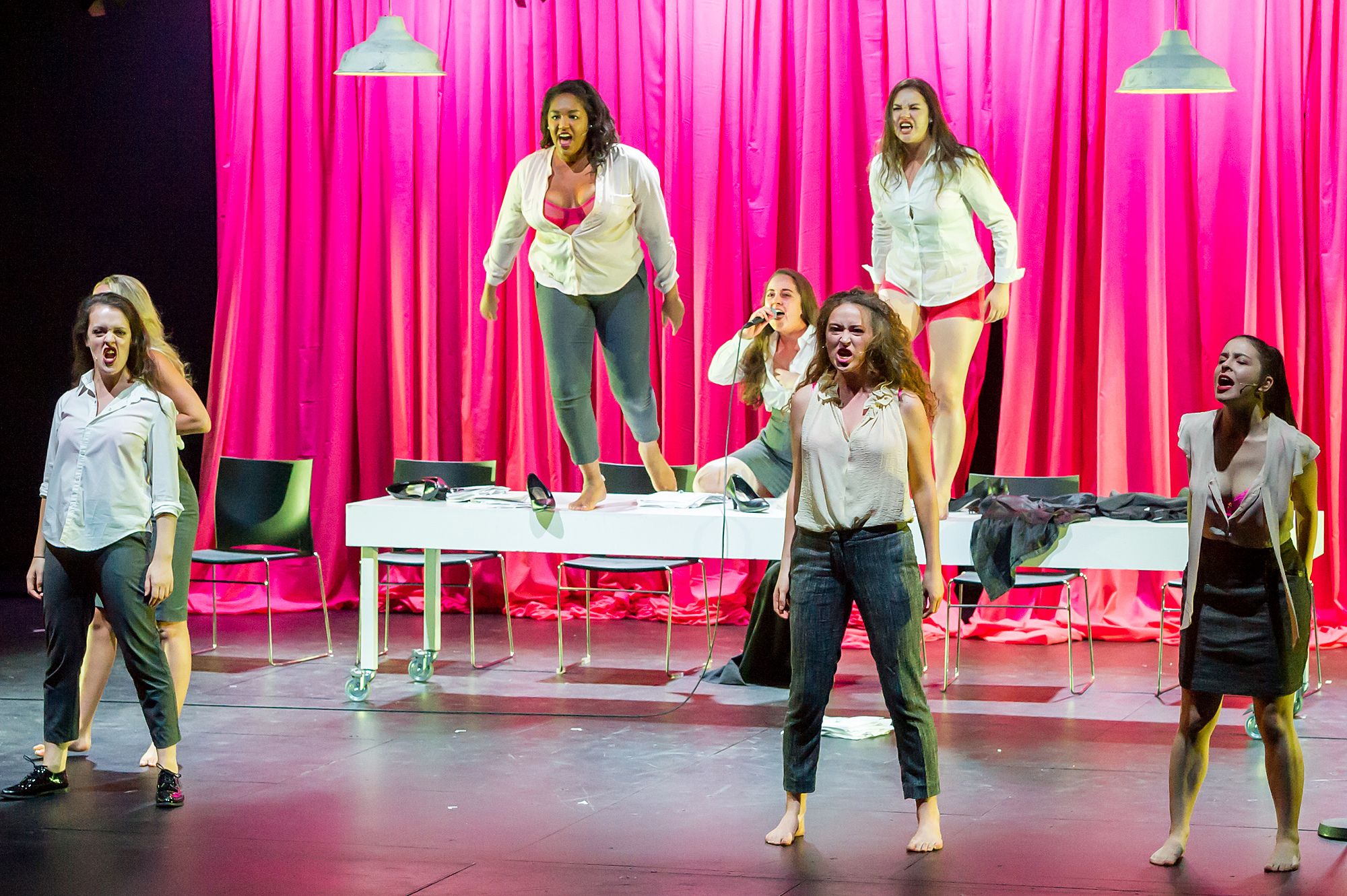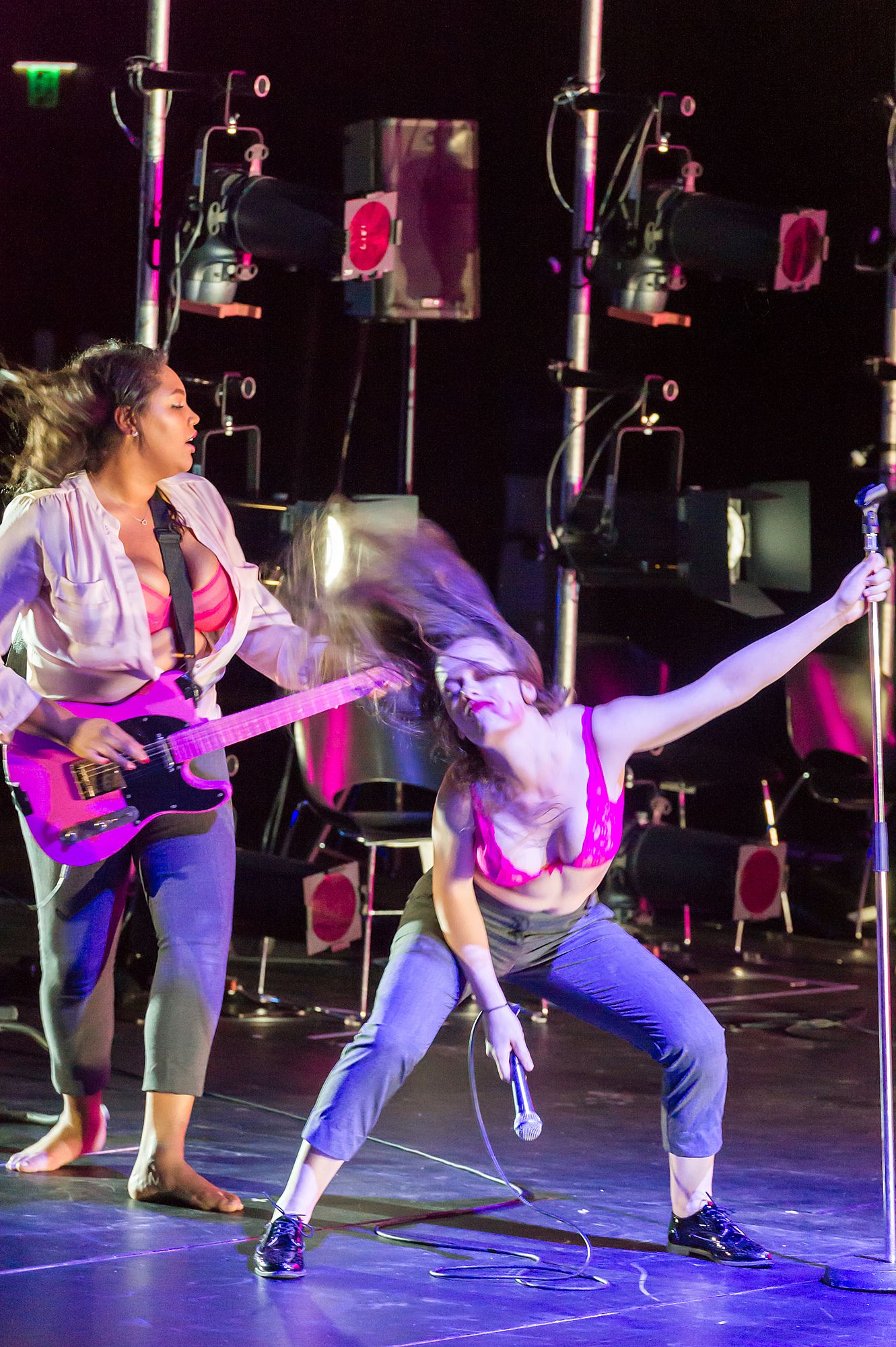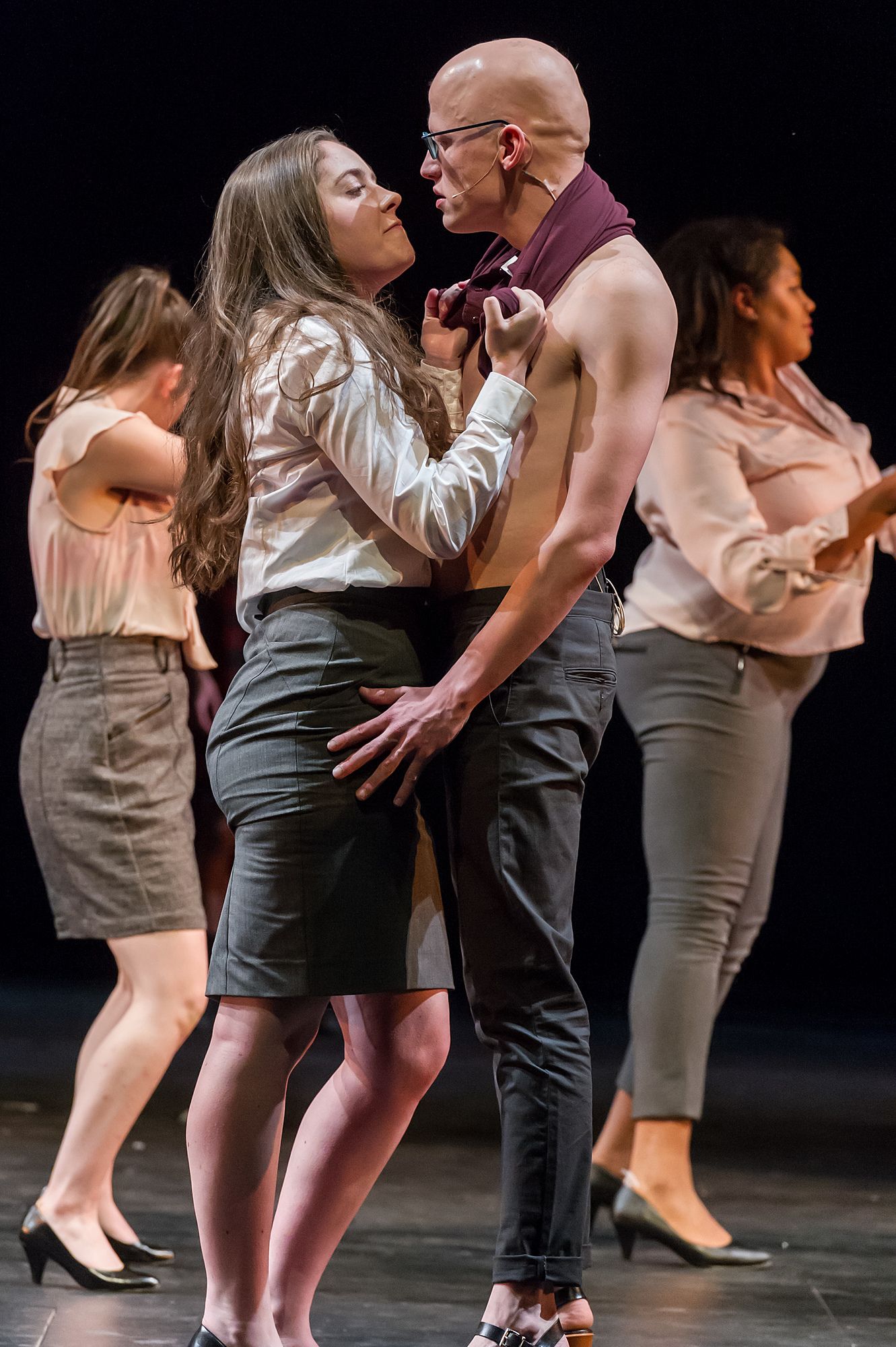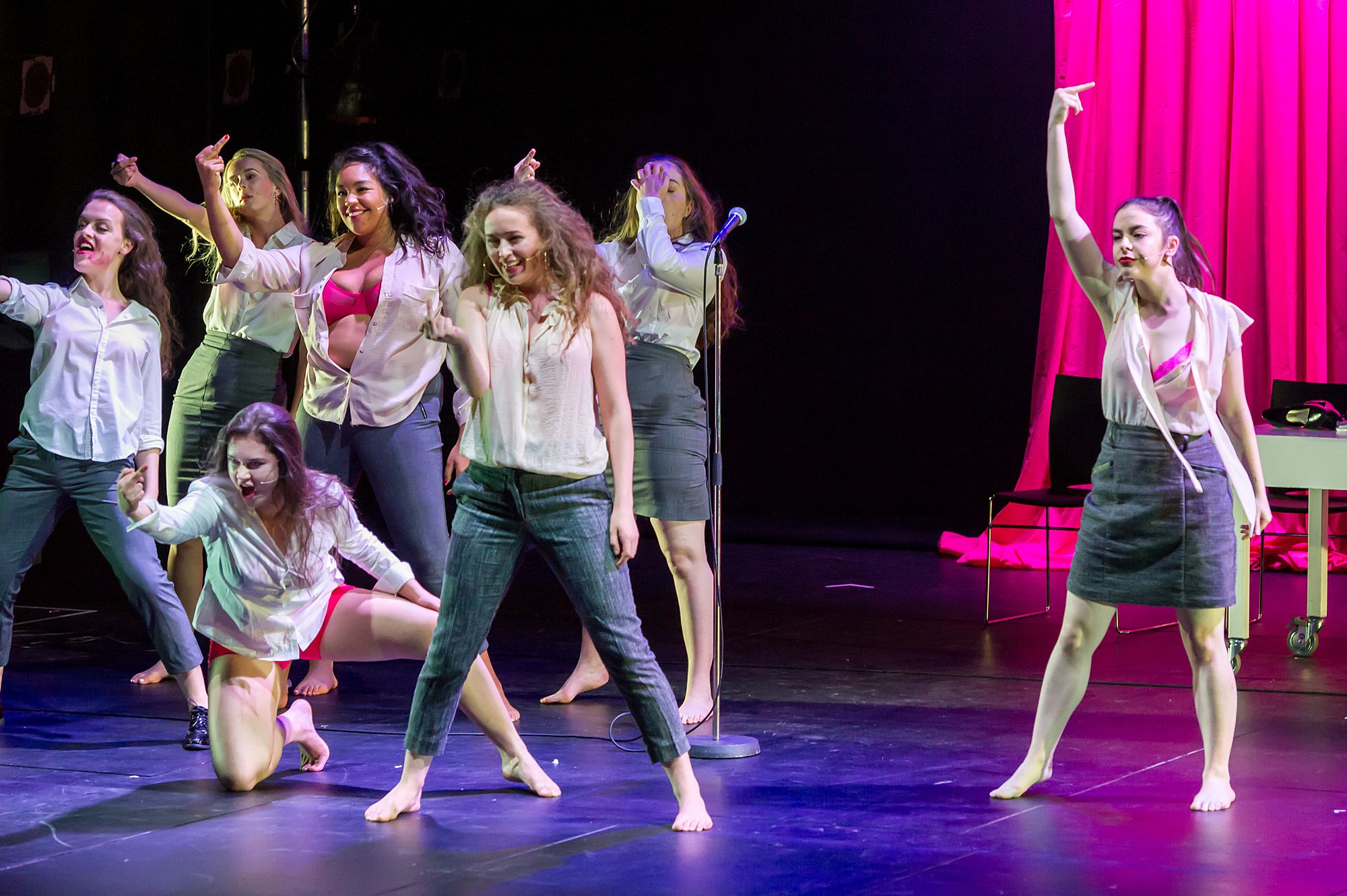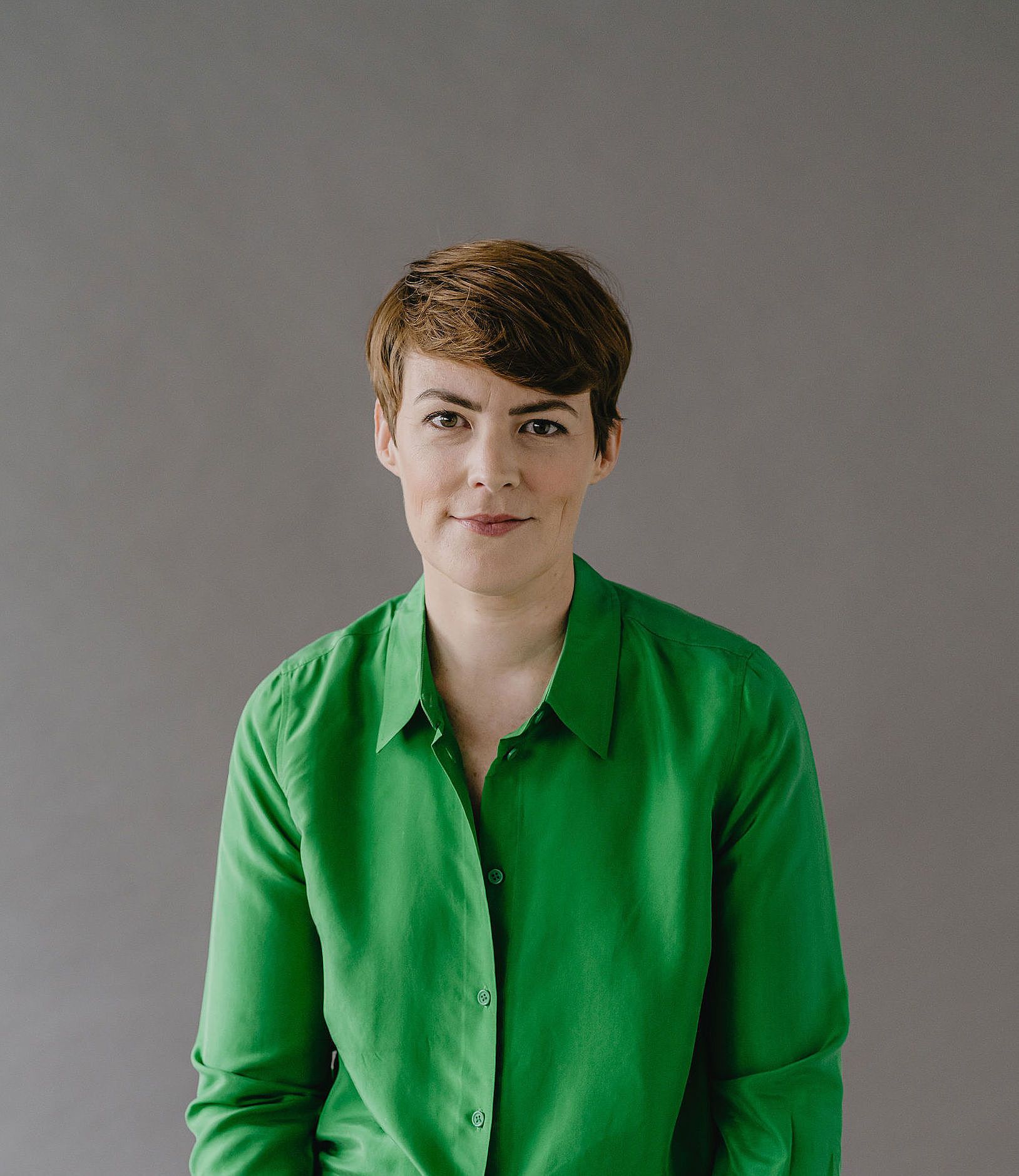Moira's Lament: A Conversational Review of Boys
Kate Prior went to Auckland Theatre Company's production BOYS, directed by Eleanor Bishop and Julia Croft.
Kate Prior went to Auckland Theatre Company's production of Boys, directed by Eleanor Bishop and Julia Croft. But 35-year-olds aren't the target audience for the company's Here and Now Festival, so she took 15-year-olds Grace, Hattie and Grace – all students at Western Springs College.
The play interrogates and explodes Greg Mcgee's touchstone 1981 New Zealand play Foreskin's Lament, which concentrates on male tribal aggression in rugby. The first act stages the play 'straight', then is undercut by a second act in which women gather in a courtroom to offer testimony of real cases of male violence towards women, and the third act works at stitching the play and the modern context together. In this, Moira, a relatively small female character in the original, becomes the main driver of the action.
Kate got Grace, Hattie and Grace on Facebook messenger the next day (while they were road-tripping up North) to chat about their experience.
Kate Prior: So what's sticking with you from last night? It could be anything - something you heard / an image / something you felt while sitting there?
Grace KM: I think what stuck with me is the total lack of empathy the rugby players had for the women. How, after all those stories the women told, they still weren't seeing the issue or were still turning a blind eye to it, which frustrated me a lot.
Kate: You mean for example when the group of women were talking about their experiences of walking home at night?
Grace KM: Yeah.
Hattie: I think what stuck with me most was the line "frightened men antagonise women", because it was short, sharp, and powerful as well as completely relevant to what they were trying to say, and summarised the arguments the women were trying to get across in the court scene. I thought it was also an extremely strong and a poignant part of the play.
Kate: When was that bit?
Hattie: Toward the end when Moira was talking to Matt I think?
Grace KM: Also how the rugby culture was so discriminatory. They belittled anyone who did anything slightly feminine in a constant mission to be masculine and alpha male. And teased each other so much.
Grace T: I remembered the different stories of the girls, and how they all felt so helpless but strong at the same time because they were sticking up for themselves. But I was disgusted by how the rugby players pretended like rape wasn't a problem because they weren't the ones doing it to the girls. It just made me feel so angry and sad that this stuff was and is happening. And there is a stigma – it's the girls problem to fix and there's something wrong with them.
Kate: Do you guys get much of that kind of rugby culture at your school?
Hattie: I think elements of it are still there in sports and groups around school.
Kate: But perhaps less at a co-ed than a single sex school do you think?
Hattie: I think so, but even so, especially with our school being so embracing of all people, it means that in sports teams and other places where suddenly like-minded students are grouped together, it's become nearly traditional to adopt that kind of rugby culture and changing room sport talk etc.
Kate: Yeah right, that's interesting.
Kate: I'm aware we're talking about the rugby players – can you just frame who they were in the piece? For example, what is the structure of Boys? Where do those rugby players come from?
Hattie: They were represented as, like, poster children for misogyny and masculinity?
Kate: That's really interesting - so kind of ultimate symbols of a culture?
Hattie: And you could see that their backgrounds influenced their actions. For example they'd grown up around fathers and brothers who had acted this way and were adopting their traits because that sort of behaviour used to come hand-in-hand (and maybe still does) with rugby and sport culture.
Grace KM: Other Grace's phone has died!
I think those rugby players came from a place of tradition, where their fathers and peers and family all have this expectation for them to be masculine and to have traditional sexual orientations and they feel trapped and have grown up trapped. So for the women to argue with them made them angry because they have these in-grown beliefs and prejudices. And they feel they have to protect their beliefs and their family and culture because they're brainwashed into thinking it's all for a good cause, which is 'rugby' and 'national pride' and 'sport'. You know, kind of 'blood is thicker than water' almost. Like their family and childhood and culture was being attacked.
Kate: Ah that's so interesting! So kind of like a culture as strong as family - or even stronger perhaps? Protection is really interesting I think – protecting ideas and beliefs for some kind of safety.
Grace KM: Yeah, and if they don't actively join it, they are belittled and teased for not 'being a man' or that they 'can't handle it'.
Hattie: Yeah and maybe that's why it has still continued today with national sport teams etc. – those ideas being so historically built into New Zealand sport through generations of family.
Kate: Like rugby gives us a strength and identity we maybe can't find elsewhere?
Grace KM: Maybe, and I think they actually could find that strength and identity elsewhere but are brainwashed into thinking they can't, and rugby is the ultimate, and it's a man's game, and if you don't play you're weak or feminine, so they do it kind of because they're threatened to.
Hattie: I think the LGBTQ+ side of Boys showed that false sense of masculinity too. All the players picked on the one gay character and disregarded the transgender character too, who is also trying to boost their sense of manliness in a way. And that's also setting it aside from 'white feminism' and turning it into intersectional feminism.
Kate: What do you mean by that Hattie?
Grace KM: White feminism is feminism that only encompasses white privileged women and children and it's a kind of pseudo-feminism.
Hattie: And intersectional feminism is looking at equality for anyone who identifies as a women, inclusive of all races, sexualities, and social status etc. Which is essentially what needs to be being taught. Which I think the play highlighted quite well.
Kate: Yeah right – so it's about how oppression is a complex mix of those factors?
Grace KM: Yeah.
Kate: Yeah I thought it was an interesting choice to have a trans person on stage who was really physically sidelined and watching, and then later on, they were the one who was trying to push on through the play script. I don't know what that means yet though.
I found the sidelining of him hard to read as a 'comment' on sidelining of trans narratives – sometimes it just seemed like he was simply being sidelined. If you know what I mean. (Maybe that's also because our main image heading into the show is the main poster image of the face of the actor Kierron Diaz-Campbell – but I'm not sure where that 'poster story' lived in the play).
Hattie: Yeah I thought his character was nearly representing his own theme and idea alongside. Possibly less about equality, and more about acceptance?
Grace KM: I think the presence of the transgender boy was interesting as he was someone who didn't have all the 'masculine' prejudices built into him, having been born female.
Hattie: So nearly like proving that misogyny is intrinsically built from background?
Kate: What do you mean built from the background? You mean from family and friends?
Hattie: Yeah and from social expectations or norms?
Grace KM: Yes, how families would push beliefs onto males from a young age, and social expectations.
Kate: Yeah the extreme gender divide – the BOYS vs GIRLS aspect kind of grated at points, but then having that presence of a trans character onstage threw it into a different relief – made the divide strange in a way.
Grace KM: Yes, boys and girls are segregated so much; extra-girly and extra-masculine, when if you took away those in-built ideas in their minds you just get two equally normal people that are the same. The transgender person really symbolised that. How truly, we're all normal people when you take away the social expectations we adhere to?
Kate: What do you mean by 'normal' Grace?
Grace KM: I suppose someone that doesn't act extra girly or masculine according to their gender, and they can just be themselves and not act in a certain way to please or be accepted into their genders culture?
Kate: Right – as themselves.
Grace KM: True.
Kate: So what's interesting is that those rugby players at the start were actually performing an old script - it's a play that was staged in 1981 called Foreskin's Lament - it's this super 'famous' New Zealand play by this writer Greg Mcgee.
Hattie: Ah yes, I did hear that.
Grace KM: Yes I heard about that.
Kate: So you knew that bit going in?
Hattie: Not quite at first, but then I put two-and-two together.
Kate: After watching it?
Hattie: When the women came out for the first time.
Kate: Ah right. Like you could see in that part that we were going into a completely different 'play'?
Grace KM: As soon as the play took a dramatic turn with the women's panel I kinda got an idea that the first act was from the original, as the slang was super old and there were no modern themes included.
Kate: Yeah it was so weird to hear all those dated terms right!? Like so not of this time!
Grace KM: Yeah true! Also the eighties music. I was quite confused because I had heard it had been adapted, but then I kind of guessed the first act was straight from the old play.
Kate: Yeah, I guess because when you adapt something, that adaptation can take many forms in terms of how much of the original text stays or is ignored, often depending on what your reasons for exploring the original text is, really.
Grace KM: Yeah, they kind of went against Foreskin's Lament in ways that questioned it as well.
Kate: Yeah so in which ways did they go against Foreskin's Lament? Or more importantly, what do you think the theatre makers intended by smashing the two 'plays' together?
Grace KM: Well, like the fact there were only two women in the original play, and in this there were many and they were central, and also how Foreskin was put in the position to have to say to the women, 'Hey! But I'm Foreskin! I'm the good guy in this play!'
Kate: Yeah that was funny right! I thought that was the best and one of the strongest moments of friction I felt between the two worlds – the hero with the 'conscience' from one play being turned into some kind of pariah or villain in the adaptation.
Grace KM: Yeah I thought that was quite good too, I loved that!
Hattie: I think politics have to be inclusive of all forms of egalitarianism in order to relate to everyone, and in the original play they excluded a lot of minorities when really they're all equally important topics to tackle. For example, the transgender issues and homophobia.
Kate: True Hattie, and I think the original play was purposely interrogating a male world and male violence to men – like it really focussed on that aspect of violence and tribal culture, and perhaps it needed to be just that. And that's where it's power came from. But I know what you mean.
Grace KM: We may have to have a brief break going out of range but will be back in ten minutes.
Kate: Okay cool!
Grace T: Hey Kate we are back!
Kate: Yay! Where have you reached now on the drive?
Grace: Waipu.
Kate: Cool!
So I'm still interested I think to hear more from others on what you reckon the theatre makers intended by placing this old text next to newly-made work?
Hattie: Sort of showing how all these beliefs are outdated. As well as intensifying the desperation the women felt by showing how long it's been around for maybe.
Kate: You mean how long this culture of aggression has been around for?
Hattie: Yeah.
Grace KM: I think it was trying to illuminate current issues, for example with the politicians who were quoted. And how some things nowadays are more relevant as opposed to back then, like transgender rights and gay rights and intersectional feminism.
Kate: I found that Foreskin's Lament world almost such a different world that I found it really hard to create links between the two I think, or I constantly was trying to, to the detriment of my own experience probably!
Hattie: I see, I see.
Grace T: It shows how fast and different everything is changing (like how different everyone's beliefs are and how we express and identify ourselves) and what is accepted in society.
Grace KM: Yeah true, maybe they were trying to show how different that world is and almost make fun of it? Really highlight how old it is.
Kate: Yeah you're right Grace T – I even think 'older' people don't get how fast ideas move now.
And yeah I think so Grace KM – so it's doing two things: it's showing how old that world is, showing up its strangeness, but then like you say, also how elements still exist in very similar ways. The words might be very different but the vibe isn't.
Hattie: Yeah and you could even be really pretentious and link that to the transgender boy wanting to get through the script faster.
Kate: Ha, yeah right Hattie! Like he's way ahead of us all – yup yup yup, we get it, come on, catch up...
Grace T: Definitely. Talking to my uncles and older family, they get very confused and are less accepting of 'new' genders/sexualities as they have not experienced this kind of change and especially how quick it's all happening.
Hattie: Yeah, whereas millennials have been born into this quite weird period of time where there's so much split controversy with our generation surrounding feminism. Because there's those who are influenced by family tradition, then those of us who've been raised aside from all that prejudice.
It's difficult to say if things will progress negatively or positively; we have come quite far with women's rights and LGBTQ+ rights and human rights in general yet it's nearly come to a stand-off I guess.
Kate: Yeah I don't know about a stand-off, but I guess maybe do you mean those who have a lot of visible anger and fear about the progression of these ideas are being just as loud and vocal?
Hattie: Yeah, yup.
Kate: Right.
I'm also aware that this would be a very different conversation if I was talking to three boys from Auckland Grammar! Or schools with more of that rugby culture.
Hattie: Most definitely.
Grace T: Yes!
Kate: Would you get boys to go and see it? Can you talk to guy mates about this stuff?
Hattie: I'm getting my friend Seb to see it tonight.
Kate: Cool!
Hattie: And I think it really depends on the guy.
Kate: Yeah right. And could you chat to Seb about the stuff in it regarding rape culture afterwards do you reckon?
Hattie: Of course.
Kate: Does this stuff ever come up in friend groups with guys? Or would you only talk about it with female friends?
Hattie: I'm quite lucky in the sense that a lot of the boys I hang out with are clued in with this stuff, but there are many groups with guys where bringing it up would be submitting yourself to social suicide.
Kate: Right. It's who you choose to surround yourself with right.
Hattie: Yeah definitely.
Grace: It changes with which guy friends we would be talking to. There are some who are very accepting and interested, then there are definitely some who just don't really care.
Hattie: Or some who care about it, just for the opposite reason we do.
Kate: What do you mean opposite reason? Like they hate all the talk about feminism?
Hattie: As in 'meninists'.
Kate: Haha! Do you seriously know guys who would self-describe as meninists?
Hattie: Oh yes, many.
Grace T: Sadly.
Kate: Wow. Do you think that's also because there's so much normalised conversation about feminism in your generation that there are people who feel they have to really make a stand against it?
Grace T: Yeah, they just want to get a reaction from us and have a different opinion.
Kate: Ah, so trolling a bit.
Hattie: Yeah and there's also a massive negative stigma surrounding feminism.
Kate: Right – so you reckon that still exists for you guys too, that stigma?
Hattie: Yeah, it does.
Kate: That sucks.
Kate: So overall, what did you think of the play in general? You had some pretty strong reactions last night? Are they still there for you?
Grace T: I really liked it. It's touched on so many important issues that need to be talked about. Yeah, the reaction is still there and I think it would be a very good idea to show to all high school students.
Grace KM: Yeah I really liked the play because it speaks for all people and it's done in a humouring way too. The impressions of the politicians, the women dancing, and the comments on the old play – the way it merges with the new – really made it interesting and easy to understand. Also the personal stories really helped with empathising with the women and understanding the unfairness of their situations. That's especially effective for high school students and they can relate to them as well.
Boys runs from April 21 – 24 at ASB Waterfront Theatre as part of Auckland Theatre Company's Here and Now Festival.
Tickets available here.
